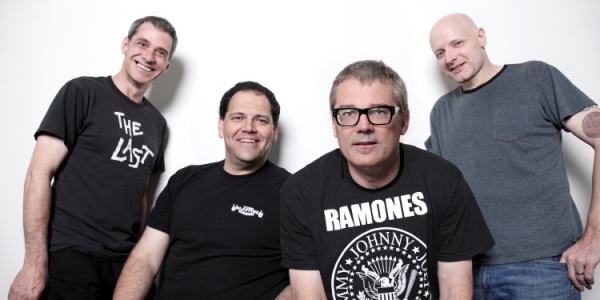In 1978, Stevenson had joined guitarist Frank Navetta and bass player Tony Lombardo to form the first incarnation of The Descendents. “At that point we had maybe ten songs, some of which ended up featuring on Milo Goes to College,” Stevenson says. “We started out with this mid-‘60s R&B hybrid with a Ramones influence, and a bit of a surf influence.” Like many of its contemporaries, The Descendents were blessed with a level of enthusiasm that was inversely proportional to the band members’ musical competence. “We made it up as we went along,” Stevenson admits. “And we also had to learn to play our instruments!”
In 1981, The Descendents recruited Milo Aukerman to take on lead vocal duties; within in a short period, Aukerman’s distinctive bespectacled appearance and excited vocal delivery would come to define much of the band’s aesthetic.
With the self-aggrandising assistance of local scenesters like Rodney Bingenhemier and Kim Fowler, and the catalytic assistance of The Ramones, the Los Angeles punk rock scene was slowly but surely bubbling to the surface. While bands such as The Gun Club and The Germs walked the precipice of punk rock danger (The Germs’ troubled lead singer Darby Crash would die of a heroin overdose in 1980 in a bizarre suicide pact with his girlfriend, while The Gun Club’s Jeffrey Lee Pierce spent much of his life in a drug-induced haze), The Descendents were as straight as their music was fast.
“We only knew our own way,” Stevenson says. We were still living at our parents’ houses. We didn’t want to be part of the heroin scene, so we didn’t do any of that.”
Notwithstanding musical and lifestyle differences, Stevenson acknowledges that there was a community of punk rock musicians in Los Angeles at the time. “The thing that I cherish the most about that time was that there was a lack of a common musical philosophy,” Stevenson says. “While we all turned up to the venues wanting to hear music, we weren’t playing the same riffs or songs. There were as many different styles as there were stars in the sky.”
The Descendents’ 1982 album, Milo Goes to College, captured the zeitgeist of LA skate punk. With 15 songs crammed into 22 minutes, the album became an instant classic, its themes of teenage nihilism reflecting the faux philosophical concerns of a generation of disaffected teenagers – not to mention providing the foundation for the LA skate-punk sound. (About five years later, Christian Slater would use the 30 second drivethrough takeaway food frenzy Weiner Schnitzel as the catalyst for teenage insubordination in the 1987 film Pump Up the Volume.)
The title of the record was far from ironic – shortly after the album was released, Aukerman left the band to study biochemistry, an academic passion that he has continued to pursue (Aukerman went onto to become a member of the highly selective club of punk rock musicians with a PhD). The Descendents continued on briefly without Aukerman, before the band was placed on ice while Stevenson took up drumming duties with fellow LA punk rock band Black Flag.
In 1985, Aukerman rejoined The Descendents to record the band’s second album I Don’t Want to Grow Up. Shortly after, Aukerman returned to his studies, thereby setting the pattern for The Descendents’ sporadic reformation and recording schedule over the next 20 years. New albums followed in 1995 (Everything Sucks) and 2002 (Cool to Be You), with the band’s tours crammed in between Aukerman’s academic commitments.
When Stevenson was diagnosed with a brain tumour a few years ago – a serious, life threatening condition that was complemented by the onset of diabetes, and complicated further by Stevenson’s increasing obesity – Stevenson was forced to dig deep to overcome his significant health problems. While it might be assumed that his personal philosophy would have provided him with the inner strength to recover, Stevenson prefers to pay tribute to his medical advisors.
“My health problems were overcome by a combination of good luck and excellent doctors,” Stevenson says. “I had one doctor who shepherded me through, and another who was a brain surgeon who sawed my head open twice to remove the tumour.” With his health now restored, and his weight now back to more acceptable levels, Stevenson is almost glowing. “I’m 49, and I haven’t felt this good since the late 70s,” Stevenson says.
Stevenson is equally philosophical about the current state of music. “I think we go through waves all the time,” Stevenson says. “Music is like a river – it goes through turns, and there are little pools where music builds up. To assess music by decades is too obtuse – it’s better to do it by month, or even by day. When people say music was better back in the day, then they’re saying that they’re old, not that the music is no good anymore. Only boring people get bored.”
BY PATRICK EMERY

